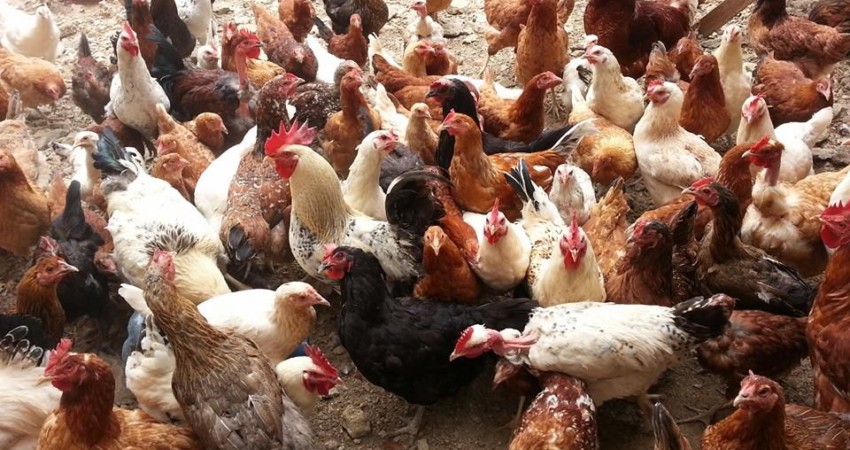

Like many people in the Eastern boarder town, Wabwire was a pretty trader mainly dealing in smuggled goods across the Kenyan boarder. However in 2005, the couple had to make a hard decision since their family had grown and was straining the retail business.
“We had been married for 5 years . However, what haunted me most was the fact that in that short time, God had blessed us with four children ,” Regina now a mother of nine children said. “During our discussions , i would always remind my husband to get priorities right and indeed he heeded to my advice, ” Regina says. They decided to dispose of a newly acquired car and invested the money in a plot of land, which they bought within the municipality. The transaction was by barter trade I surrendered the car which was valued at Shs. 9m,” Wabwire says. On top of that i added 4m to acquire land of 50*100m. He added that the land had a permanent modest house and lots of space, which they used for expansion.
Starting Poultry
In 2008, they relocated to the new house, and embarked on the poultry enterprise. ” We bought six local chickens, five hens and one cock from Busia central Market,” Wabwire said. With in a year, we had over 400 birds, which we sold in the December season and earned Shs 6m, We sold each bird at Shs.15,000,” he explained . How did the six birds birds multiply to 400 in one year? “It is not rocket science , Wabwire said. On average a local he lays 30 eggs per brooding. So every time a hen lays, we would pick the egg and keep it away. Once the hen is done with laying and is desperate to brood, we would then give it between 16 and 20 eggs. As soon as the chicks were hatched , we took the away to a secure environment. When deprived, the hen would again start laying eggs after three weeks. Then we would repeat the cycle.
Venturing into layers.
When they disposed off the local stock, Wabwire said to a friend an accomplished poultry farmer who had closely followed their project convinced them to switch to layers for better returns. “We heed his advice, as egg production from layers spans for a period of two years. It was also a good spans for a period of two years. It was also a good suggestion because the demand for eggs in Busia is high,” Regina said. In 2009 they erected the structures in their backyard and started the project with 2000 layers. At Shs 3,200 per chicks , the first stock cost Shs 6.4m. To cut down on the costs, they sought technical advice and the formula from a poultry breeding firm in Kampala on how to make their own feeds.
“We bought ingredients and mixed feeds individually , an idea that is considerably cheaper,” Wabwire said. Since then, the project has steadily grown to the current 6,300 birds with 4,000 of them mature and laying eggs. On average , they get 89 trays of eggs. Th couple also has 2000 layers and 300 grower marsh variety of birds stock that are two months old. A stranger to the couple’s home, which is enclosed in a gate, may not have any clue that there is a poultry enterprise within the homestead because the place is quiet.
Savings accrued from the layers enterprise enabled the couple to elevate themselves from the the deep litter system of rearing to using cages. There are 36 cages on the farm with each accommodating 150 birds. With a cage going for Sh 2.5m, the Wabwires have invested more than Shs. 90m in the poultry cage structure. The site is tidy with the interior furnished with poultry cages , all laid out in neat rows. Each of the brown 4000 layers is securely tucked away in its compartment. I would recommend all poultry farmers to go for cage system because it keeps the place tidy but most importantly deter theft, especially by the workers.
The productive stock of 4000 layers that the Wabwires have kept for a year offers a daily production of 2,670 eggs, equivalent to 89 trays of 30 eggs each. At a farm gate price of Shs 9,500 per tray that translates into daily gross earning of Shs 845,000 and Shs 25,365,000 monthly. However, feeds, labor and other input costs consume over 70% of the earnings, a cost which stands at Shs 17.76m. The couple also earns Shs. 800,000 monthly from chicken droppings which is sold as manure t the community.
The couple also says they are yet to get over a major set back they suffered in 2016. “Although we had a mutual understanding with the suppliers of the chicks to compensate us , nothing has been realized yet,” she said. Until the couple acquired the cages they would make immeasurable losses of both eggs and birds. The employees would steal from them. The number of trays collected on a daily basis was always irregular, they would realize that the birds had been stolen while disposing of the stock. The number of off layers would not match the stock. The cost of feeds increases almost every day, something which reduces their profits.
Next Reading
Basic care for Kids
During July to September, its “raining” kids at most farms. The question on table, what […]
Previous Reading
Feeding is essential for successful Livestock farming
Livestock keeping is an enterprise whose main objective is to get profit at the end […]
 Contact Jaguza Support
Contact Jaguza Support